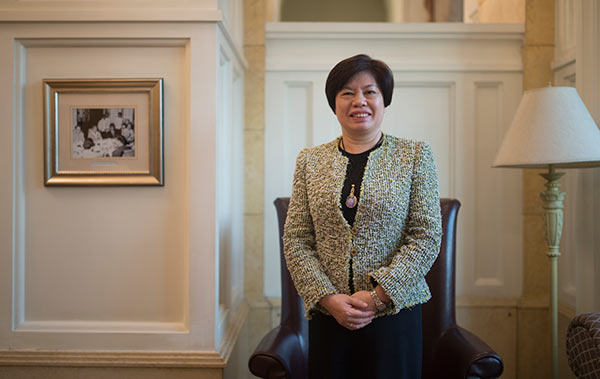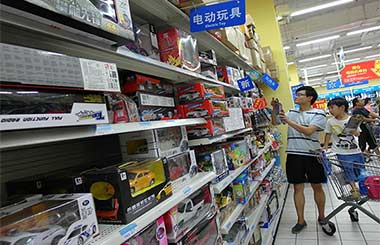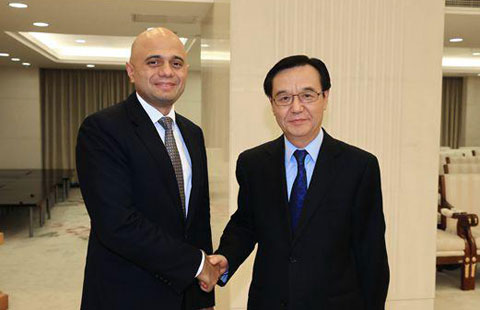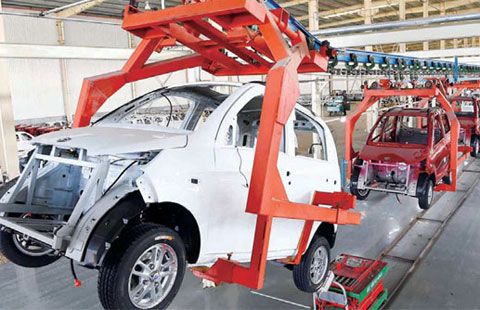NPC deputy takes her cap off to Belt and Road strategy
Updated: 2016-03-09 14:24
By Kahon chan(chinadaily.com.cn)
|
|||||||||
 |
|
Pauline Ngan Po-ling. |
Headwear manufacturer outlines balancing act of moving up the value chain.
The success story of a headwear manufacturer's foray into Bangladesh underscores the vast potential of Beijing's Belt and Road Initiative.
National People's Congress (NPC) deputy Pauline Ngan Po-ling, also vice-chairperson of Mainland Headwear, takes pride in her baseball cap manufacturing business. "I think my company was the only one to register a significant profit surge last year," she said.
A circular issued by Hong Kong-listed company Mainland Headwear last December identified the production line in Dhaka, Bangladesh, as its source of good fortune.
It was not the only Hong Kong-based garment maker to depend on Bangladesh to stay buoyant. Textile giant Yangtzekiang Garment reported a 10-percent revenue plunge for the six months ending last September; its only factory that did well is also in Bangladesh.
Ngan's Bangladesh production line is fully booked until 2017. But at home, her garment counterparts are fading fast.
"They used to put up hiring notices. Now notices to lease out their premises are all over the place," Ngan said of her industrial neighborhood in Shenzhen.
The labor costs are forcing much of the garment industry out of China. Bangladesh, though immature for delicate manufacturing, is a paradise for labor-intensive tasks. The cost of hiring a worker in Shenzhen could buy eight times the labor productivity in Bangladesh, she said.
The Shenzhen factory hires 1,600 workers for product development and smaller orders. Ngan said it was the lone survivor among the "big five" Hong Kong headwear makers in Guangdong province.
The national lawmaker addressed the woes of Chinese industry on March 6, when Zhang Dejiang, NPC Standing Committee chairman, attended panel discussions of the Hong Kong and Macao delegations. She hoped the central government could help industries move out of low-value tasks, and support others to move up the value ladder.
The infrastructure boom derived from the Belt and Road Initiative, Ngan added, would benefit Chinese industries which set up new bases in South Asia.
Growing goodwill
Ngan goes to great lengths to show care for the Bangladeshi employees. Her workers receive regular overtime pay. She has educated Chinese supervisors not to treat workers rudely. Eggs are offered to workers to take home. "People regularly faint at work due to low blood sugar, a result of malnutrition," she said.
Life expectancy in Bangladesh, at about 71 years, is ranked 111th among 194 countries, according to the World Health Organization. She hopes her factory can at least help people in nearby villages to live better.
Ngan believes her workers are satisfied. Union strikes, known as "hartals", are notoriously violent in Bangladesh. Her facility has not seen a strike for two years. She recalled vividly how her local partner became concerned and agitated when she insisted on speaking directly to a protest rally through a loudspeaker. "I told them to talk to me directly about everything," she said.
Ngan still travels to Dhaka once every two weeks. She advises the Hong Kong government to sponsor students to see Bangladesh and other places by themselves. This is because exposure and knowledge are vital to seizing opportunities. Ngan believes they are also key to the long-term health of Chinese secondary industry.
Design and innovation vital: Ngan
Design and innovation are crucial for China's garment industry to move up the value ladder as labor costs will not fall, National People's Congress deputy Pauline Ngan Po-ling said.
Research and development (R&D) only took up 2.1 percent of China's GDP in 2015. R&D spending in South Korea, by contrast, is equivalent to 3.7 percent of its GDP. Ngan said she did not move the design team out of Hong Kong because with a focus on exports, her designs must remain in a place that has better protection for intellectual property rights.
"They do tend to copy," Ngan commented on her counterparts that primarily serve the mainland market. "Manufacturers are almost doomed to fail once they step into the overseas market, as they will face and probably lose an avalanche of copyright lawsuits."
Lucrative land value driven by the real estate boom has further eroded industrialists' patience to set up and run a manufacturing business. "Working in this business requires a sense of responsibility and passion because it takes time to wait for a return on your money," she said.
Her answer to overcome the temptation of fast money is education. "It involves a process," she said. Graduates returning from studies abroad may facilitate this learning curve.
Nevertheless, she stressed the central government should immediately unleash policies to prevent more factories from going out of business. If no factory survives the market chill, she says, the government's initiative to move industry up the value chain will not materialize.
Once an opportunity is missed, there is no looking back, Ngan quoted top legislator Zhang Dejiang as saying on Sunday. She feels Hong Kong is already too late to develop a high-tech sector, even though the central government has pledged support in the latest five-year plan.
"No one can render you help if you yourself are doing nothing," she said.
kahon@chinadailyhk.com
Today's Top News
Longer visas for foreign experts eyed to ease entry
Female condom made in China wins WHO approval
Longer visas for foreign experts eyed to ease entry
Lavrov, Kerry hail progress in Syrian ceasefire
PM Fico's Smer party leads Slovak election: exit poll
Britain to take lead in promoting EU-China trade talks
Chinese brands make a mark in Europe
Expanding footprint
Hot Topics
Lunar probe , China growth forecasts, Emission rules get tougher, China seen through 'colored lens', International board,
Editor's Picks

|

|

|

|

|

|






